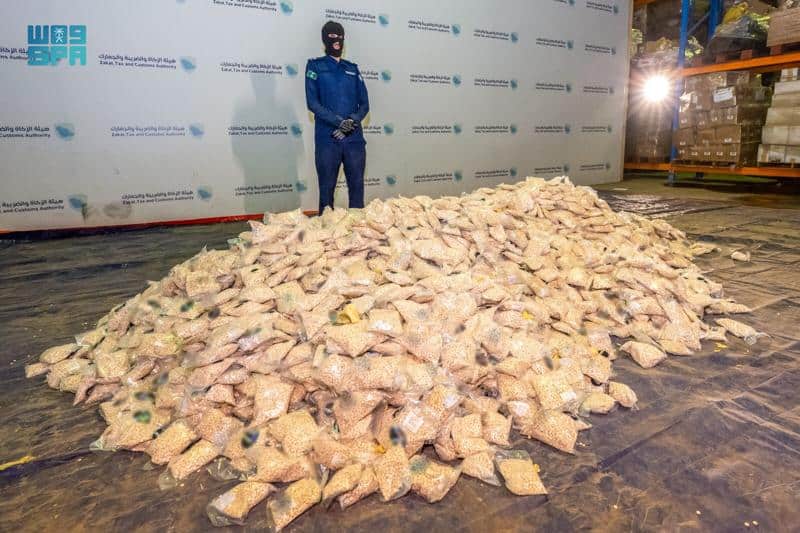Jeddah, Saudi Arabia — Saudi Arabia’s General Directorate of Narcotics Control (GDNC) have arrested a citizen in Jeddah governorate for smuggling 209,000 pills of the narcotic methamphetamine.
Legal action has been taken against him, and the case has been referred to the Public Prosecution, SPA reported.
Security authorities have requested all citizens and residents in the Kingdom to promptly report any information related to drug smuggling and trafficking. In Makkah, Riyadh, or the Eastern region, people can call 911.
For other regions of the Kingdom, information can be passed on to the authorities at 999. The General Directorate of Narcotics Control can be contacted at 995 or via email: [email protected]. All reports will be treated with the utmost confidentiality, they said.
Saudi Arabia has seen an influx of the addictive amphetamine captagon flooding in from war-torn Syria and Lebanon.
After becoming a major market, Saudi Arabia is hitting back, ending a moratorium on the death penalty for drug cases and launching a zealous crackdown.
The result is at least 20 executions for drug offences since last year, according to an AFP tally, and a sharp rise in arrests.
At least two Saudi security officers have been killed in drug raids.
Party pill –
Across Jeddah, roadside billboards urge citizens to report any illicit drug activities to the authorities.
While alcohol is illegal in the conservative country, it is also believed to be the world’s biggest market for captagon, which is used by wealthy Saudis as a party pill and by workers to stay awake during long shifts.
While previous anti-drug campaigns targeted smuggled shipments, mainly from Syria and Lebanon, the latest initiative is zeroing in on dealers and users within the country.
Apparently to provide a deterrent, a nearly three-year moratorium on executions for drug crimes was scrapped last year. Saudi Arabia is one of the world’s biggest users of capital punishment, executing 147 people in 2022.
“In the last year to two years, we have seen an uptick in internal arrests and the use of the death penalty (in drug cases),” said Caroline Rose of the New Lines Institute think tank.
The shift from border seizures to arrests of dealers is partly due to “a focus on security issues surrounding captagon and a recognition of just how deep some of these networks go”, Rose told AFP.
The campaign is also aimed at keeping drugs out of the hands of Saudi youth, the drivers of an ambitious reform agenda to diversify the oil-dependent economy. Fifty-one percent of the 32.2 million population is under 30.
“Saudi Arabia is carrying out a huge economic project…and the youth are the main pillar of this project,” said Sulaiman al-Oqaily, a Saudi political analyst.
Addiction on the rise –
Rampant drug use is taking its toll, with more than 200,000 addicts in Saudi Arabia, according to health ministry figures cited by domestic media.
Growing numbers are seeking addiction treatment, mainly because they fear arrest, said Hamad al-Sheehan of the Rushd Specialized Center in Riyadh.
“After the recent campaign, the numbers have increased at the center,” the director of treatment said from his office, where at least 10 young men were waiting to be seen.
“We currently receive 1,000 people per month instead of only 100 previously.”
He said that captagon and other methamphetamine-type drugs are among the most abused in the kingdom. Most of his patients are between 17 and 21 years old and half are women, he said.
If Sheehan’s patients fear arrest, the crackdown is working, Oqaily said.
“The message is if you don’t fear for yourself, you should fear the government,” he said.
Last month, Interior Minister Prince Abdulaziz bin Saud bin Nayef warned drug dealers and smugglers that they will not escape.
“We are still at the beginning of the campaign,” he said.

